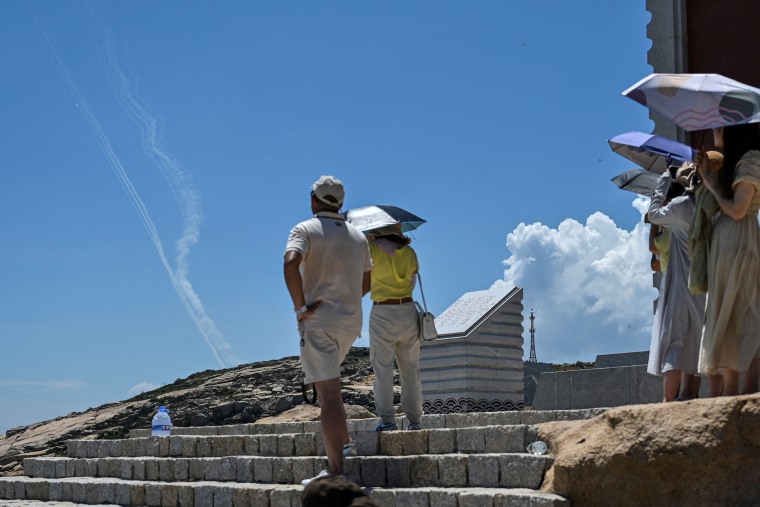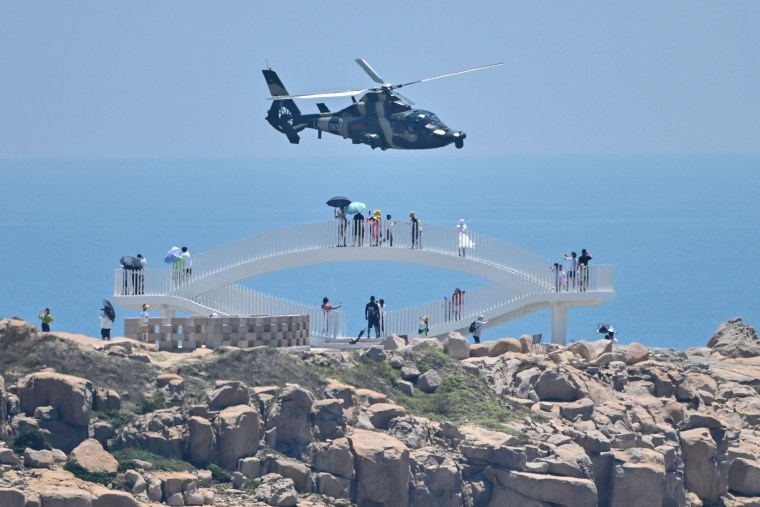TAIPEI, Taiwan — China began its promised military drills in the airspace and waters around Taiwan on Thursday, as the Beijing-claimed island braces for the potential fallout of U.S. House Speaker Nancy Pelosi’s visit.
China’s People’s Liberation Army launched 11 ballistic missiles into the waters off northern, southern and eastern Taiwan in several waves starting at 1:56 p.m. (1:56 a.m. ET), the Taiwanese Defense Ministry said. It is the first time China has fired missiles into the waters around Taiwan since 1996.
The ministry condemned what it called China’s “irrational actions,” saying they undermined regional peace.
Japan also strongly condemned the strikes and it said five of the missiles landed in waters in its exclusive economic zone. In a televised address Defense minister Nobuo Kishi said the drills were a “serious problem.”
About an hour earlier, the PLA began what are believed to be unprecedented live-fire drills in six zones that effectively encircle Taiwan’s main island, which is about 100 miles off the coast of China.
Chinese state media reported that 100 aircraft from the Eastern Theater Command took part in the operation and the exercises had “achieved the expected results.”
The drills were announced shortly after Pelosi arrived in Taiwan late Tuesday night, and are set to last until Sunday. Taiwan says they are a serious violation of its sovereignty and amount to air and sea blockades, affecting international shipping, aviation and trade.

Pelosi, who left Taiwan on Wednesday evening, was the highest-ranking U.S. official to visit the island in 25 years. Beijing claims the self-ruling democracy of 24 million people as its territory, and viewed her visit as an infringement of its sovereignty.
Pelosi’s visit and Beijing’s furious response have sent tensions in the Taiwan Strait to their highest point in decades, further straining relations between China and the United States.
On Thursday, Chinese Foreign Minister Wang Yi described Pelosi’s visit as “manic, irresponsible and highly irrational,” Reuters reported, citing Chinese state broadcaster CCTV.
Speaking in Phnom Penh, Cambodia, at a meeting of the Association of Southeast Asian Nations, Wang said China was taking necessary and timely defensive countermeasures to protect its sovereignty and security.
A spokesperson for China’s military later told the official Xinhua news agency that the exercises were “a strong deterrent to collusion between the United States and Taiwan.”
Later, in a separate statement to state media, PLA Senior Colonel Shi Yi said sea and airspace control off the eastern coast of Taiwan had been lifted “since the live-fire missile drills have hit the targets precisely.”
The Taiwanese Foreign Affairs Ministry strongly condemned the launches, which it compared to missile tests by North Korea, and called on the international community to continue to show solidarity with Taiwan.
The Taiwanese Defense Ministry repeated its resolve to avoid escalating tensions across the Taiwan Strait.
Taiwanese forces “are operating as usual and monitor our surroundings in response to irrational activities from PRC, aiming for changing the status quo & destabilizing the region’s security,” it said on Twitter on Thursday, using an abbreviation for China’s formal name, the People’s Republic of China. “We seek no escalation, but we don’t stand down when it comes to our security and sovereignty.”
In a televised address, Japan's defense minster Kishi also called the drills “a serious problem that affects the security of Japan, as well as the safety of our people.”
“It appears that China launched nine ballistic missiles,” he said, adding that it was “estimated that five of these missiles fell within Japan’s exclusive economic zone.”
“We strongly condemn this incident and we have lodged our complaint to China through diplomatic channels,” Kishi said.
Though an actual Chinese invasion of Taiwan does not appear to be imminent, some experts say the Pelosi visit has given China a valuable opportunity to conduct ambitious military maneuvers that might help prepare for one.
China’s exercises “are designed to test, under real world conditions, whether Beijing can effectively blockade Taiwan, a feat that will factor heavily in determining whether China can, in fact, sustain a prolonged military campaign against [it],” Craig Singleton, a senior China fellow at the Foundation for Defense of Democracies in Washington, said in written comments.
China had already heightened its military activities around Taiwan before Pelosi arrived on the island. On Wednesday, while she was there, it sent 27 warplanes into Taiwan’s self-declared air defense identification zone, which is wider than the island’s official airspace.
Two of the formations crossed the median line in the Taiwan Strait, according to mapping provided by Taiwanese authorities, a deviation from the usual flight path. China conducts such military sorties almost daily, but the number is usually in the single digits.
On Wednesday evening, after Pelosi left, Taiwan’s military shot warning flares at an unidentified aircraft over Kinmen, a Taiwanese island about 6 miles off the coast of China.
The Taiwanese Defense Ministry said Thursday that it appeared to be an unmanned drone. It stressed the move was in line with standard operating procedures, telling people to remain calm.

While Chinese President Xi Jinping sees Taiwan’s “reunification” with the mainland as a historic inevitability, recent public opinion polls show the majority of Taiwanese have no desire to become part of China, and instead want to maintain the status quo.
China repeatedly warned the U.S. against the visit in the days leading up to Pelosi’s arrival, vowing there would be “serious consequences.” The White House says the speaker’s visit was consistent with U.S. policy on Taiwan and should not be used to precipitate a crisis.
The international community has expressed concern over the Taiwan Strait tensions, with ASEAN saying the situation “could lead to miscalculation, serious confrontation, open conflicts and unpredictable consequences among major powers.”
Foreign ministers from the Group of Seven nations, including the United States, said China’s response risked destabilizing the region.
“There is no justification to use a visit as pretext for aggressive military activity in the Taiwan Strait,” they said in a statement Wednesday.
The Chinese Foreign Ministry objected to the statement, canceling a meeting between Wang and the foreign minister of Japan, a G-7 member, that was scheduled to take place in Cambodia on the sidelines of the ASEAN event.
China is justified in the measures it has taken in response to Pelosi’s visit, ministry spokesperson Hua Chunying said at a regular news briefing Thursday.
“The malicious provocation of the United States came first, and the legitimate defense of China came second,” she said.